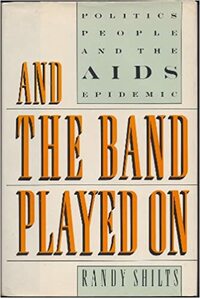Take a photo of a barcode or cover
challenging
dark
emotional
informative
inspiring
reflective
sad
slow-paced
challenging
emotional
informative
sad
slow-paced
A fantastic piece of investigative journalism which was incredibly moving to read. My main reason for not giving five stars is the book's handling of Gaetan Dugas - we now know that he wasn't actually patient zero and Shilts' editor has expressed regret for the way the book vilified him.
informative
slow-paced
challenging
emotional
informative
medium-paced
I bought a used copy of this book in which the previous owner left a ballet ticket dated December 13, 1988, 6 years before it's author Randy Shilts passed away from AIDS complications.
This book is a thorough and frustratingly repetitive story of people fighting to study an epidemic and not getting the funding, care, or attention needed. All because this epidemic targeted the most vulnerable peoples of the country; queer people, addicts, sex-workers, and immigrants. I maintain that the AIDS epidemic should be taught in American history classes, as an example of how epidemics shape history and how prejudice shapes society.
Shilts' book is not just a fantastic resource on the beginnings of AIDS; it's a skilled work of narrative construction in nonfiction writing. A global story with multiple centers is cleanly bounced around as the time slowly ticks forward. Sometimes the most important part of nonfiction writing is providing the right details. As you eventually forget most of the information, some things just stick with you. For me, I can't let go of the detail of the man who was the first to die from a disease that only affected sheep. AIDS devastated the immune system so totally that the world itself became poisonous for these people.
At over 500 pages this book ends where many begin the story of aids, with the death of Rock Hudson. All of that time, content, and research, and yet the people in power did not care enough to fight an epidemic they could have.
I highly recommend this for those who like:
- American History
- Queer History
- AIDS history
- Queer issues
- Epidemiology
- Politics
- Emergency Response studies/Public health studies
This book is a thorough and frustratingly repetitive story of people fighting to study an epidemic and not getting the funding, care, or attention needed. All because this epidemic targeted the most vulnerable peoples of the country; queer people, addicts, sex-workers, and immigrants. I maintain that the AIDS epidemic should be taught in American history classes, as an example of how epidemics shape history and how prejudice shapes society.
Shilts' book is not just a fantastic resource on the beginnings of AIDS; it's a skilled work of narrative construction in nonfiction writing. A global story with multiple centers is cleanly bounced around as the time slowly ticks forward. Sometimes the most important part of nonfiction writing is providing the right details. As you eventually forget most of the information, some things just stick with you. For me, I can't let go of the detail of the man who was the first to die from a disease that only affected sheep. AIDS devastated the immune system so totally that the world itself became poisonous for these people.
At over 500 pages this book ends where many begin the story of aids, with the death of Rock Hudson. All of that time, content, and research, and yet the people in power did not care enough to fight an epidemic they could have.
I highly recommend this for those who like:
- American History
- Queer History
- AIDS history
- Queer issues
- Epidemiology
- Politics
- Emergency Response studies/Public health studies
Graphic: Child death, Death, Homophobia, Terminal illness
Moderate: Suicide, Medical content
emotional
informative
reflective
sad
medium-paced
This is a long and frustrating read. It'll make you want to tear your hair out. I do think some of these 600 posts could've been edited down.
dark
emotional
informative
reflective
slow-paced
challenging
emotional
informative
reflective
sad
medium-paced
dark
emotional
informative
sad
slow-paced
Phenomenal. Reading this book is like watching a train wreck in slow motion and you can't pull yourself away from it. We all know how awful the AIDS Crisis was and you think you're prepared, but reading "And the Band Played On" made me realize that it was actually much worse. It's heavy, but truly an incredible book.
Before reading this book, I wrongly assumed that this book covers the entire AIDS Crisis. I should've realized when I saw the '87 pub date that it only covers the first half of the 80s (up until treatments are discovered).
All of that being said, this book's weakness is the fact that it really only focuses on New York City and San Francisco's efforts (or lack-there-of), thus leaving out a large swathe of the country. Then within those communities, the majority of the people that the narrative follows are white - even after the largest demographic of people with AIDS become people of color. I truly think that the book would've only benefitted from more flushed out/diverse perspectives.
Kind of kicking myself for not reading "The Mayor of Castro Street" first.
Before reading this book, I wrongly assumed that this book covers the entire AIDS Crisis. I should've realized when I saw the '87 pub date that it only covers the first half of the 80s (up until treatments are discovered).
All of that being said, this book's weakness is the fact that it really only focuses on New York City and San Francisco's efforts (or lack-there-of), thus leaving out a large swathe of the country. Then within those communities, the majority of the people that the narrative follows are white - even after the largest demographic of people with AIDS become people of color. I truly think that the book would've only benefitted from more flushed out/diverse perspectives.
Kind of kicking myself for not reading "The Mayor of Castro Street" first.
Graphic: Death, Homophobia, Terminal illness, Medical content, Pandemic/Epidemic
Moderate: Child death, Drug use, Sexual content, Suicidal thoughts, Death of parent
Minor: Alcoholism, Cancer, Hate crime
challenging
informative
reflective
slow-paced







